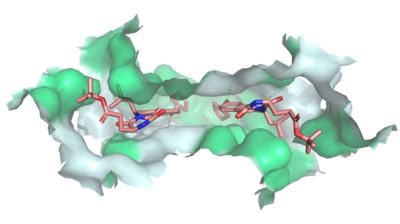Sandbox Reserved 1613
From Proteopedia
(Difference between revisions)
| Line 17: | Line 17: | ||
== Relevance == | == Relevance == | ||
| - | Due to ABCG2 excreting xenobiotics from the cell, they also transport essential cancer drugs out of the cell. By utilizing certain | + | Due to ABCG2 excreting xenobiotics from the cell, they also transport essential cancer drugs out of the cell. By utilizing certain binders (<scene name='83/832939/5d3-fab/2'>5D3</scene>, it is able to be stabilized for crystallographic imaging. This has allowed researchers in the past decade to make advances based upon the greater understanding of its structure. Competitive inhibitors such as <scene name='83/832939/Abcg2_bound_to_mz29/3'>MZ29</scene>) have been developed making it possible to shut down these transporters in order to get cancer drugs to remain in and cause apoptosis in the reference cells. However, this could have residual effects on the excretory system as ABCG2 would no longer be able to excrete anything from the particular cells inhibited, including those detrimental to the body. This has caused ABCG2 disfunction to be linked to gout, among other disorders. |
== Structural highlights == | == Structural highlights == | ||
[[Image:Ligand_Interactions_6ffc.png|400 px|right|thumb|Figure 2]] | [[Image:Ligand_Interactions_6ffc.png|400 px|right|thumb|Figure 2]] | ||
Revision as of 13:01, 7 April 2020
ABCG2 Transporter Protein
| |||||||||||
References
- ↑ Jackson SM, Manolaridis I, Kowal J, Zechner M, Taylor NMI, Bause M, Bauer S, Bartholomaeus R, Bernhardt G, Koenig B, Buschauer A, Stahlberg H, Altmann KH, Locher KP. Structural basis of small-molecule inhibition of human multidrug transporter ABCG2. Nat Struct Mol Biol. 2018 Apr;25(4):333-340. doi: 10.1038/s41594-018-0049-1. Epub, 2018 Apr 2. PMID:29610494 doi:http://dx.doi.org/10.1038/s41594-018-0049-1
- ↑ Manolaridis I, Jackson SM, Taylor NMI, Kowal J, Stahlberg H, Locher KP. Cryo-EM structures of a human ABCG2 mutant trapped in ATP-bound and substrate-bound states. Nature. 2018 Nov;563(7731):426-430. doi: 10.1038/s41586-018-0680-3. Epub 2018 Nov, 7. PMID:30405239 doi:http://dx.doi.org/10.1038/s41586-018-0680-3
- ↑ Taylor NMI, Manolaridis I, Jackson SM, Kowal J, Stahlberg H, Locher KP. Structure of the human multidrug transporter ABCG2. Nature. 2017 Jun 22;546(7659):504-509. doi: 10.1038/nature22345. Epub 2017 May, 29. PMID:28554189 doi:http://dx.doi.org/10.1038/nature22345
- ↑ Fetsch PA, Abati A, Litman T, Morisaki K, Honjo Y, Mittal K, Bates SE. Localization of the ABCG2 mitoxantrone resistance-associated protein in normal tissues. Cancer Lett. 2006 Apr 8;235(1):84-92. doi: 10.1016/j.canlet.2005.04.024. Epub, 2005 Jun 28. PMID:15990223 doi:http://dx.doi.org/10.1016/j.canlet.2005.04.024
Student Contributors
Samuel Sullivan, Jaelyn Voyles, Shelby Skaggs

